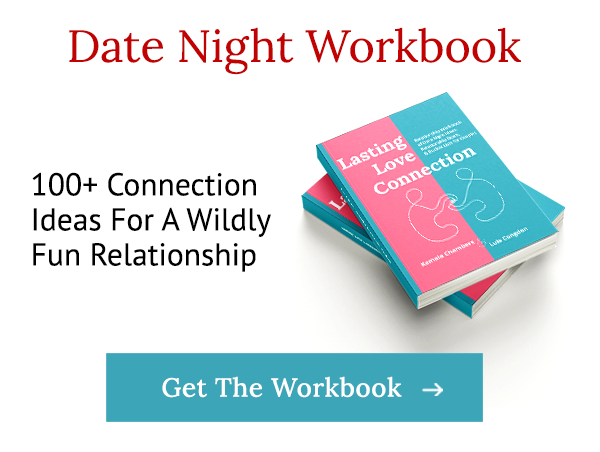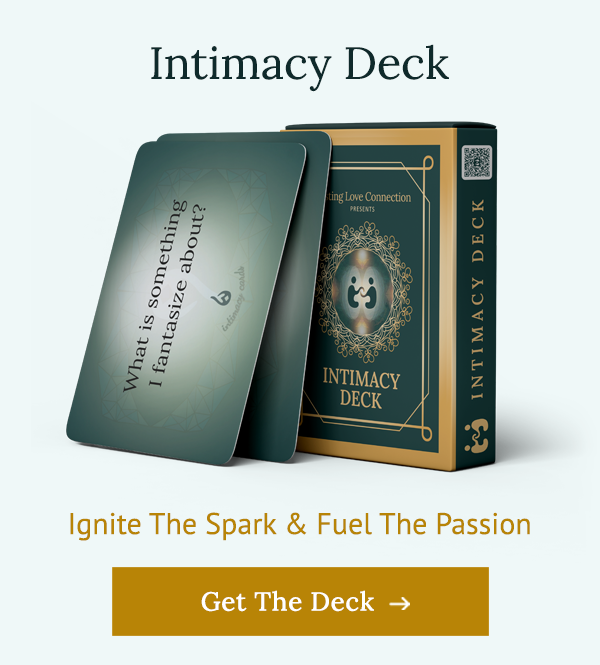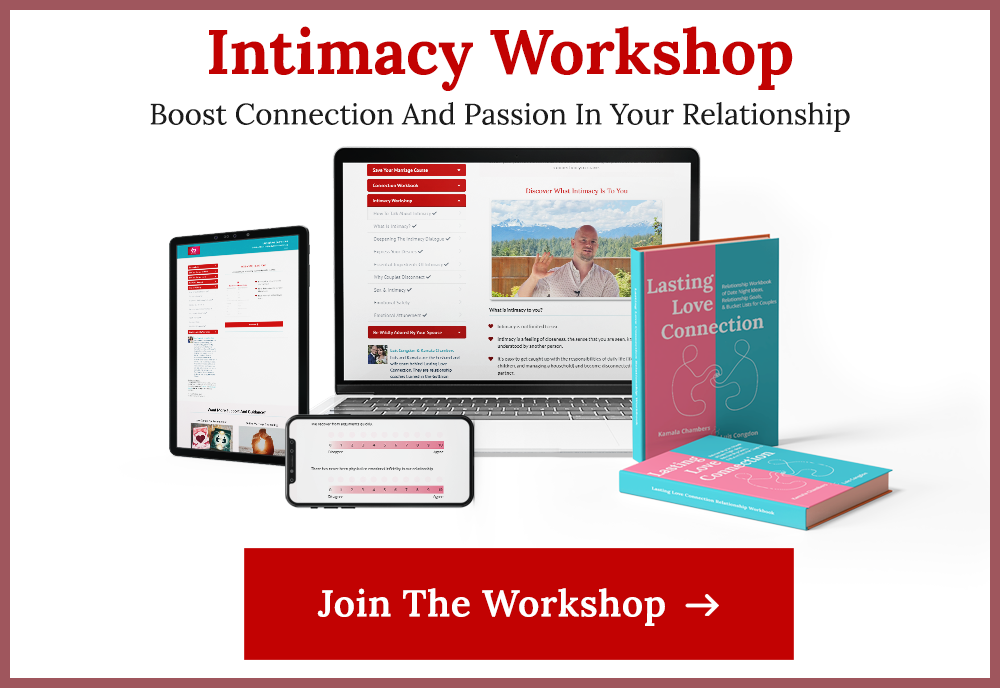Warning: Undefined array key "titleWrapper" in /home1/lastinj7/public_html/wp-content/plugins/seo-by-rank-math/includes/modules/schema/blocks/toc/class-block-toc.php on line 103
What is EI, and how can you develop emotional intelligence in a relationship?
Every couple we talk to says effective communication is the key to a great relationship.
What most couples don’t know is how important it is to be emotionally connected. Without this skill, communication is like two people talking at each other without really feeling and hearing one another.
What if your partner could tune into your feelings, and neither of you got overwhelmed or felt like fleeing when things got heated?
To communicate with this level of connection and security, you’ll need to develop emotional intelligence.
Emotional intelligence is essential to romantic relationships, affecting how you express yourself and respond to your partner.
This article will explore the signs of emotional intelligence, the benefits of being emotionally intelligent in long-term relationships, what to do if your partner has low emotional intelligence, and how to boost your emotional intelligence skills.
Table of Contents
What is emotional intelligence, and how does it affect your relationship?

Emotional intelligence (EI) is essential in forming and maintaining strong relationships. Emotional intelligence allows you to recognize, understand, and manage your own emotions. Additionally, emotional intelligence helps you identify and respond to other people’s emotions. When you have emotional intelligence, you can identify and label specific emotions. Express your emotions appropriately.
Maintain emotional stability in stressful situations. Use emotional information to inform your thinking and behavior. Interpret emotional cues from others. Show empathy for other people’s emotions. In addition to your love life, emotional intelligence enhances other aspects of your life. You can apply emotional intelligence skills in the workplace and in other relationships with friends and family. As you learn to understand your emotions and those of others, you’ll become a more grounded and compassionate person.
What is the difference between emotional intelligence and social intelligence?

emotions, social intelligence focuses more on how they interact with others. When someone is high in social intelligence, they have what is known as social awareness. Social awareness involves the ability to interpret others’ emotions through non-verbal cues (like physical appearance and body language), engage in active listening and tune in to another person, understand social cues, and display empathy and concern for others. That said, social awareness does not come naturally to everyone. Some people may not be able to pick up the nuances of social interactions, like picking up on social cues or reading others’ body language. However, just as emotional awareness is a skill you learn, so is social awareness – and it’s something you can work on and improve.
What does emotional capacity mean?

Emotional capacity is the ability to tolerate and experience emotions. Many people find it easy to accept positive feelings like joy and excitement yet have difficulty coping with difficult emotions such as fear, shame, or disappointment. You may have developed unhelpful ways of coping with these uncomfortable emotions — like avoiding situations that trigger anxiety or lashing out when experiencing shame. However, these strategies likely cause more harm than good in your life.
For example, if you’re avoiding necessary conversations due to fear, it negatively impacts your relationship. Increasing emotional capacity involves accepting the full range of your emotional experience. It involves increasing your tolerance for uncomfortable emotions by observing what you’re feeling and accepting it without letting it overtake you. A high emotional capacity allows you to move through feelings as they arise while remaining connected to yourself and your partner. The greater your emotional capacity, the more you can create deep intimacy and connection in your relationship.
What are the signs of emotional intelligence?
The seven key areas of emotional intelligence include self-awareness, self-regulation, motivation, empathy, social skills, communication skills, and problem-solving skills.
The 7 areas of emotional intelligence in a relationship
There are seven vital areas of EQ in relationships.
Self-awareness

Self-awareness is the ability to recognize and understand your own emotions.
When you are self-aware, you appropriately manage your thoughts, feelings, and behaviors.
You avoid repeating behaviors that harm your relationship.
For example, if you tend to interrupt your partner when they’re talking, you can recognize it and make a conscious effort to do something differently.
Moreover, you understand your emotions and can communicate your needs to your partner.
Self-regulation

Self-regulation is the ability to manage your emotions effectively.
When you have self-regulation skills, you understand how your behavior impacts the people around you.
When conflict arises, you adjust your own behavior instead of acting out of anger and frustration.
For instance, if you feel yourself becoming heated during a disagreement, you can self-regulate by taking a break and going for a walk to calm down before returning to the conversation.
When you and your partner have healthy ways to manage your emotions instead of lashing out or yelling, it prevents conflicts from escalating and increases emotional safety.
Motivation
Emotionally intelligent people are driven by internal desires rather than external rewards or punishments.
A strong sense of purpose motivates you to take action and work towards your goals in life.
Empathy
Empathy is the ability to understand another person’s feelings and perspectives.
Another way to think about showing empathy is ‘putting yourself in someone else’s shoes.’
Even if you’ve never experienced the exact same thing, think of a situation in your life when you’ve felt the same way.
Showing empathy is like saying, ‘I know that feeling. You’re not alone.’
When you empathize, you ensure the other person feels heard and understood.
Social skills

Social skills involve how you interact with other people in different environments.
Strong social skills allow you to communicate effectively with others and collaborate on projects.
On the other hand, a lack of social skills can make forming and maintaining close relationships difficult.
Communication skills
People with high emotional intelligence in a relationship tend to have better communication skills.
You communicate your concerns calmly instead of reacting out of anger or frustration.
In turn, you’ll be able to avoid unnecessary conflicts and get to the root of the issues more quickly.
Problem-solving skills
Problem-solving is being able to identify solutions during a difficult situation.
When you and your partner have a conflict, problem-solving allows you to take a step back instead of getting swept up by your emotions.
Effective problem-solving means that you and your partner want to understand each other’s perspectives and find a compromise that works for both of you.
The benefits of emotional intelligence in a relationship

Emotional intelligence is an essential aspect of a romantic relationship.
Here are just a few of the many benefits of emotional intelligence in relationships.
Improves communication
When you have emotional intelligence in a relationship, you better understand and communicate your feelings and needs.
For example, say you’re resentful towards your partner about your respective roles in the relationship, as most of the housework falls on you.
You’ll bring your concerns to your partner so you can talk it through and come to a resolution together.
If you don’t have that self-awareness, you’ll be more likely to react passive-aggressively by simply stopping certain chores and expecting your partner to step up.
Regular relationship check-ins allow you to address issues as they arise and talk through problems constructively.
For more guidance and support with relationship check-ins and building healthy communication skills, pick up the Lasting Love Connection Relationship Workbook.

Emotional intelligence in a relationship reduces conflict
Knowing how to identify and manage your emotions leads to fewer misunderstandings and unnecessary conflicts.
When you have emotional intelligence, you discuss minor issues before they build up and become more significant relationship problems.
When you disagree, you talk through the issue together calmly and respectfully.
If you do feel yourselves leaving your window of tolerance, you’re able to take a break from the conversation and return at a later time.
This way, you can de-escalate conflict before it leads to blow-up arguments that harm your relationship.
Increases understanding
emotional intelligence in a relationship allows you and your partner to understand each other’s perspectives and feelings, leading to greater understanding.
If you have low emotional intelligence, you’re more likely to become defensive or direct blame at your partner, only seeing a situation from your viewpoint.
Instead, you recognize that your perspective is not the only one and want to understand where your partner is coming from.
Enhances emotional safety and trust
When you and your partner have high emotional intelligence, it creates a foundation of emotional safety and trust in your relationship.
High emotional intelligence in a relationship allows you and your partner to feel safe enough to open up about your emotions without fear of being judged or rejected.
When your partner knows how to express their feelings and needs and responds sensitively to your emotions, it deepens trust.
Emotional intelligence in a relationship boosts happiness
Emotionally intelligent people tend to be better equipped to handle difficult conversations without letting them escalate into full-blown arguments.
When you and your partner are emotionally intelligent, there is a culture of mutual respect and understanding that boosts happiness and relationship satisfaction.
How does emotional intelligence help you argue more constructively in a relationship?

Emotional intelligence helps you and your partner to navigate disagreements more constructively.
Emotional intelligence allows you to avoid blow-up fights
When you and your partner are emotionally intelligent, you’re better able to recognize and manage your own emotions.
You can express yourself calmly and rationally instead of being overtaken by anger and saying something you can’t take back.
When you understand your emotions, you can get to the root of the issue instead of blaming or attacking your partner.
Emotional intelligence helps you understand and express your needs
When you’re unclear about your feelings and needs, it is more challenging for your partner to know how to support you.
Think of emotions as signals, alerting you of important information– about what you care about and what might need to change in your life.
When you tune into your emotional cues, you learn more about yourself and your needs.
In turn, you can share your emotional needs with your partner.
Emotional intelligence improves your ability to resolve conflict
A person with a low EQ is more likely to be focused on being right or winning the argument.
When you have emotional intelligence in a relationship, you’re more focused on finding common ground.
You seek to understand each other’s perspectives and use conflict resolution skills to find a solution that works for both of you.
Can empathy be developed?

Empathy is a key aspect of a healthy relationship, as it allows you to communicate effectively, understand each other’s emotions, and build trust.
Fortunately, empathizing with others is a skill you can develop with time and effort.
Practice active listening
To cultivate empathy, work on actively listening to your partner without judgment or criticism.
As your partner speaks, maintain eye contact and allow them to finish their thoughts without interrupting.
Further, resist the urge to jump in with your own opinions or suggestions.
Most times, people are not looking for advice as much as they want to feel heard and understood.
Reflect back the feelings your partner is expressing.
For example, ‘I can see how frustrating that would be.’
Practicing active listening cultivates deep intimacy, understanding, and trust.
Ask meaningful questions

It’s more difficult to empathize with another person when we don’t understand what they are going through.
Boost empathy for your partner by asking meaningful questions, such as ‘What was that like for you?’ or ‘Tell me more about…’
Understanding your partner on a deeper level allows you to better empathize with them and offer more patience and compassion.
For a fun way to get to know your partner better and deepen intimacy, pick up the Intimacy Deck.
Add in more physical touch
Another way to develop empathy for your partner is to increase physical touch.
Physical touch releases oxytocin- a hormone associated with bonding, love, security, and trust.
Boosting physical touch can be as simple as holding hands during date nights, cuddling on the couch while watching a movie, or sharing a long hug before leaving in the morning.
What do you do if your partner lacks emotional intelligence?

Having a partner with low EQ can contribute to challenging relationship dynamics.
If your partner has a low EQ, it makes communication more difficult and leads to more misunderstandings and hurt feelings.
If your partner doesn’t understand your emotional cues, you might feel unheard, unsupported, or even emotionally neglected.
Having a low EQ does not make your partner bad or wrong.
Emotional intelligence is a life skill that not everyone has the opportunity to learn.
Generally speaking, we are never taught emotional intelligence skills in school.
Fortunately, there are steps you can take to strengthen emotional intelligence in a relationship.
Talk openly about the issue
First, sit down with your partner and bring up the issue in a non-judgmental way.
For example, you might open the conversation by asking your partner about how they experience their emotions.
Avoid placing too much pressure, as it can make your partner get defensive.
Instead, share how working on emotional intelligence together would benefit your relationship and help you to feel more connected.
Practice identifying and expressing your emotions
The next time your partner vents about something in their life, prompt them to label their specific emotions.
Encourage your partner to use “I statements” when sharing their feelings- such as “I feel sad when…”
Over time, noticing their feelings and voicing them will become more natural.
Additionally, you can try activities like role play, where one partner acts out different feelings while the other person guesses what emotion they’re displaying.
This exercise can be a fun and helpful way to practice recognizing the emotions of others.
Suggest couples counseling
Couples counseling provides a safe space for you and your partner to work on recognizing, understanding, and managing your emotions.
At Lasting Love Connection, we’ll teach you tools for relating to your emotions in healthy ways that support your relationship goals.
Book a complimentary consult to see if working with us would be a good fit.
Don’t neglect self-care
Taking the time for self-care is essential within a relationship.
However, it’s even more vital when your partner’s low EQ is causing strain in the relationship.
Prioritizing self-care helps to:
- Enhance your emotional and mental health
- Boost self-esteem
- Relieve stress
When you’re at your best, you’ll be better able to navigate challenges in your relationship.
Exercises for developing emotional intelligence skills

You and your partner can use the following intimacy-building exercises to improve your emotional intelligence skills and strengthen your relationship.
Reflection dialogue
This communication exercise involves you and your partner sharing your thoughts, feelings, and experiences without judgment or criticism.
While your partner is speaking, practice actively listening without interrupting.
During this exercise, use “I” statements such as “I feel…” or “I think…”
Once your partner has shared, reflect back what you heard to ensure your understanding.
Empathy exercise
This exercise will strengthen your ability to see things from your partner’s perspective.
Select a situation that has caused conflict in your relationship. When did you feel deeply hurt by your partner?
Then, take turns sharing why you reacted in certain ways while seeking to understand why your partner reacted the way they did.
You and your partner will gain insight into each other’s perspectives, equipping you to navigate future conflicts with more understanding and compassion.
Practice mindfulness
Mindfulness is simply connecting to the present moment.
When practicing mindfulness, you bring non-judgmental awareness to your emotions, thoughts, and reactions without judging or pushing them away.
Mindfulness creates more space between noticing your emotions and responding.
As you observe your emotions without being swept up by them, you can choose how you want to react.
To practice mindfulness, try the following exercise:
Start with just one minute. You don’t even have to add a new routine into your life – you can add more presence to what you’re already doing.
During one of your routine tasks – like walking to your car, eating a snack, washing dishes, or taking a shower – tune into the present moment.
Bring your focus to your breathing, the sights, sounds, smells, and sensations in your body, and observe whatever comes up without judgment.
Develop healthy coping strategies
When emotions become overwhelming, it’s crucial to have healthy coping strategies to help you self-regulate.
These coping strategies could include deep breathing exercises, calming visualizations or mantras, or engaging in physical activity.
That way, when a conversation gets heated, you have tools to self-regulate so you don’t react impulsively in ways that damage your relationship.
While developing emotional intelligence skills takes time and effort, it is ultimately worth it for your relationship to thrive.
Learn more about skills to enhance your EQ in the Intimacy Workshop For Couples.







0 Comments